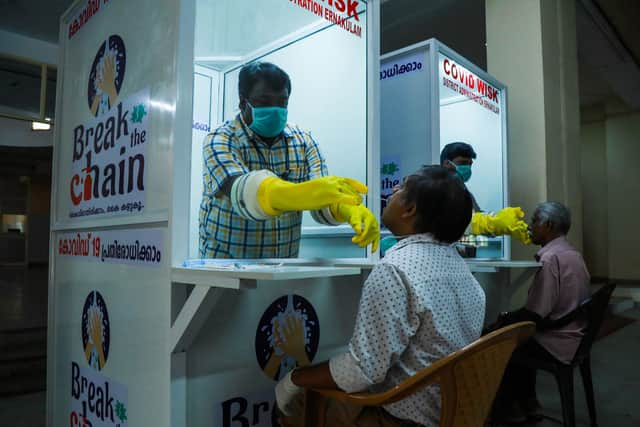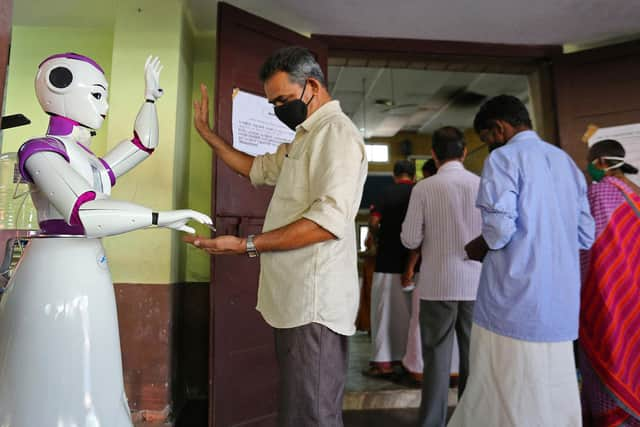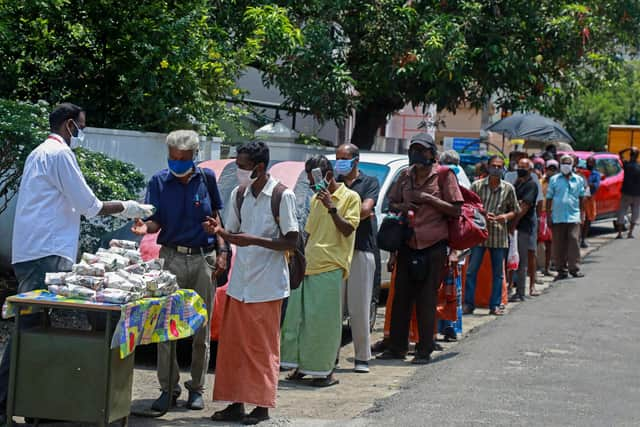Covid in India: How Kerala's success story turned into a cautionary tale – Dr George Palattiyil
When Covid-19 first struck on 30 January 2020, this model state – with its exemplary achievements in human development and poverty reduction – was quick to respond. Containment, isolation, and tracking were initiated to arrest the spread.
Lessons learned from managing the Nipah virus in 2019 helped flatten the curve. Recognition of Kerala’s Covid success was widespread, but the praise was premature.
Advertisement
Hide AdAdvertisement
Hide AdKerala has a high density of population and a significant number of people live and work outside the state and in other parts of the world.
When Covid-19 was declared a global pandemic, the government of India decided to repatriate its citizens from different parts of the world; however, its plan did not include the provision of a negative Covid test, nor a requirement for home quarantine on arrival or track-and-trace mechanisms.
Starting in May 2020, many Keralites returned to their homeland, and as is customary culturally, mingled with their family and friends without any precautions.
To make matters worse, large gatherings for religious festivals and a series of political protest rallies were held. This led to an unprecedented spike in Covid-19 cases.
The state government responded yet again with alacrity. An increased capacity to test, track and trace was deployed, and isolation and home quarantine for 15 days made mandatory for those entering the state.


With infection rates rising significantly and serious criticism of how the state government was handling the pandemic, Kerala’s health system ramped up its response, and the death rate remained comparatively low.
Travelling from Edinburgh to Kerala in December 2020, I was amazed to see just how well the system worked. Apart from registering on the government’s Covid-19 Jagratha portal and producing a negative TP-PCR test result, I was required to home-quarantine for 15 days. During this time, an accredited social health activist worker checked on me twice.
It was evident that the state continued to operate high disaster preparedness, given the test-positivity rate also continued to remain high.


Advertisement
Hide AdAdvertisement
Hide AdHowever, the deadly second wave of Covid-19 infections that began in mid-April 2021 and is consuming all of India now, is the direct result of complacency, callousness and incompetence.
It is well-known now that India recently witnessed large religious congregations and elections in several states. The country’s Election Commission wilfully flouted pandemic guidelines and failed to curb mass election rallies and lengthy campaigns − leading a state high court to rule that this amounted to murder.
Wearing no mask, India’s Prime Minister Narendra Modi proudly boasted “I’ve never seen such huge crowds!” at a high-octane election rally in West Bengal.
Accountability, leadership, transparency and integrity – the very tenets of a real democracy − have given way to nationalism, political muscle-flexing and the cult of personality. Dissent in any form is lynched, and an alternative story projected.


India today is − and has been for several years – investing more in monuments and stadiums, statues and temples, while poverty and inequality continue.
The government has failed to provide basic health care for a majority of its citizens, while the private sector has continued to invest in super-speciality hospitals for the rich.
Covid-19 has exposed India’s health fault lines. At a time when the country is crying out for hospital beds and oxygen, and people are dying in greater numbers than funeral pyres can accommodate, the government is in the midst of a $3 billion project to rebuild New Delhi’s iconic central vista, seat of the Indian government.
A country that takes pride in being the home of global vaccine production is acutely short of supplies. Vaccination drives across the country have been put on hold.
Advertisement
Hide AdAdvertisement
Hide AdThe situation is not much better in Kerala. The recent high-voltage electioneering in the state, with politicians exempt from the usual quarantine restrictions, definitely added fuel to the flames, while India’s leader asserted in January that the country was free of Covid-19.
On 12 May, Kerala reported its highest single-day spike, with 43,529 new cases. As is the case for the rest of India, the real numbers are feared to be a lot higher.
Though part of a comparatively better health system, hospitals are struggling to cope, and profiteering by private hospitals is being reported daily.
However, the renewed commitment of the state government is demonstrating yet again how a more dedicated response can be mounted to flatten the curve. Apart from declaring a state-wide lockdown, field hospitals are being set up to boost existing bed capacity, while the production and supply of medical oxygen is being augmented.
The state government is also setting up 36,000 dedicated camps to house more than 200,000 migrant workers. Efforts to vaccinate as many people who are eligible for a second dose have been accelerated, and the distribution of kits containing essential items to fight the virus has been restarted.
Recognising the impact of exorbitant charges collected from Covid patients by private hospitals, the state government has also capped treatment rates in the private sector. Lauded by the state’s high court, the policy is to be implemented with immediate effect.
The state’s chief minister, Pinarayi Vijayan, has exhorted the local government to concentrate on playing a proactive role at the forefront of Covid prevention efforts, just as they had when the pandemic started. We can only hope there is an end in sight soon.
Dr George Palattiyil is senior lecturer in social work at the University of Edinburgh
A message from the Editor:
Thank you for reading this article. We're more reliant on your support than ever as the shift in consumer habits brought about by coronavirus impacts our advertisers.
If you haven't already, please consider supporting our trusted, fact-checked journalism by taking out a digital subscription.
Comments
Want to join the conversation? Please or to comment on this article.
